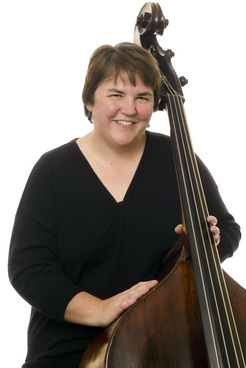by Daniel Hathaway

But underpinning all of Handel’s glorious arias and stirring choruses are the composer’s equally fetching bass lines, played by the indefatigable continuo department — cello, bass, and sometimes bassoon, with a keyboard player or two filling in harmonies on harpsichord or organ.
I spoke with Apollo’s Fire principal double bass Sue Yelanjian by telephone, explaining that I wanted to write a preview of Apollo’s Fire’s forthcoming Messiah performances “from the bottom up.”
Sue Yelanjian: That’s the best part!
Daniel Hathaway: And why do you think so?
SY: The bass part drives the whole piece, as it does in most Baroque music. It sets the tone from the very first beat, whether it’s a beautiful aria, or something that’s very angry or dark. I just love the bass line.
DH: Do you find that different composers write different kinds of bass lines?
SY: Handel’s bass lines are much simpler and not as thorny as Bach’s. They’re more comfortable to play, but the bass line in Messiah never stops. I won’t deny that it’s a physical trial to get through the piece. The principal cello and the keyboard player have the biggest challenge.
DH: The double bass does get a few breaks from time to time.
SY: Yes, in the angel arias. And over the years we’ve done some of the violin solo arias with solo cello.
DH: How did you get started playing double bass in the first place?
SY: I started the summer after fourth grade in my public school system in a suburb of Milwaukee. I actually picked the cello first, but they said they didn’t need cellos, so I ended up playing the bass.
DH: You’re one of the most versatile bass players I know. You play with the Akron Symphony, Cleveland Pops, and Toronto’s Tafelmusik in addition to Akron Baroque and Apollo’s Fire. What kind of adjustments do you have to make to switch between modern and period instrument orchestras?
SY: It used to be a little harder to go back and forth. I remember a three-month stretch when I only played early music in really small orchestras, then I played principal with the Blossom Festival Orchestra where I had to play Gershwin solos thirty feet away from the singer and the drummer. I was so used to being close to everything that playing in a large ensemble was a little scary. But as for the instrument itself, I’ve just gotten used to switching between styles, so it’s not so hard anymore.
DH: Do you switch out instruments as well?
SY: I only have two basses. One is set up with gut strings for Baroque playing, and I use a larger one — that one’s actually older — for modern playing.
DH: And bows?
SY: I have my modern bows, then I have one I use for Baroque, and a transitional bow for Mozart and Beethoven.
DH: Back to Messiah. You’ll be playing with cellos and other continuo players. How do you come to a meeting of minds on articulation in such a long piece?
SY: René Schiffer and I have been playing Messiah for so many years that we’ve just developed a style together. I try to do what he does, but I make the notes just a little shorter because the bass resonates so much in those huge churches. Also, if you listen to the choir — and we have such a great group of singers — the phrasing and articulation become self-explanatory.
DH: I understand that René won’t be playing Messiah this time.
SY: He has a Baroque project with the New World Symphony in Miami this month, so Mime Yamahiro Brinkmann is coming in from Sweden to play principal cello. She and I have known each other for fifteen years — we met playing in a Tafelmusik project in Germany — though we’ve done more Beethoven and Mozart together than continuo playing. She’s fantastic, and it will be fun but different, because I’ve always done this with René.
DH: You’ll be situated behind her in the orchestra. Do you coordinate more by sound or by sight?
SY: I do it by sound, but it’s amazing how much I can tell by watching someone’s shoulders, especially for cutoffs. If cellists sit still, they can be pretty hard to read, but Mime moves a lot when she plays. I don’t think it’s going to be a problem.
Jeannette Sorrell will lead Apollo’s Fire in five performances of Handel’s Messiah, from December 10-16 in different venues around Cleveland. Details here.
Published on ClevelandClassical.com December 6, 2016.
Click here for a printable copy of this article


